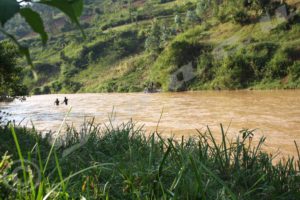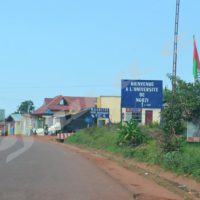
The Akanyaru river separating Burundi and Rwanda
Imbonerakure have kidnapped and ransomed Rwandan civilians in the Akanyaru Valley in the south of Rwanda, locals in the southern province say. Security in Rwanda’s Akanyaru Valley has worsened since July, locals told Iwacu.
Imbonerakure sleep in the valley. When we go there to look for grass for cattle, one of them gets up. He picks one of us and takes him to the Burundian side of the border, where many of his friends are”, a victim declares.
As the Akanyaru River has changed its path due to drought, the border is no longer clear. The river now passes inside Burundi, so Rwandans don’t need to cross a river to get to Burundi. Imbonerakure take cover in the valley on the Burundian side. One Rwandan says he knows they are Burundians because, “their clothes bear a Burundian flag” – also suggesting they are members of the security forces.
The Mukindo sector, one of sectors in Gisagara district closest to Burundi, has suffered due to these attacks. In Akanyaru valley, Burundians and Rwandans usually work together in rice plantations. No one cares about geographic limits. But now there is no water in Akanyaru and no rice in the valley. People only come to find grass for livestock. The Imbonerakure always lie down in the ditches, locals say. They get up one by one and whoever they capture, they push him or her down and then beat them. “They have beaten me enough, until my husband brought 50.000FBU” one victim told Radio One in Kigali.
The amount paid in ransom varies between BIF30.000 and BIF100.000 FBU. The Imbonerakure beat and injure those who have no money to pay.
Leaders warn population to avoid the area
Moise Ndungutse, the Executive Secretary of Mukindo sector, has warned the population not to go there. “ They shoudln’t go there anymore. With drought, Akanyaru has changed its path, and now the border is not clear. Our people come onto Burundian land without knowing. We told them to stop”.
The population is scared to enter the valley. They go with fear. They no longer use their land. Contacted, Nancy Ninette Mutoni, the CNDD FDD national secretary of information and communication said she was not aware of the case.
Before the crisis that began in Burundi in April 2015, relations were good between both populations. Many Burundians were living in Mukindo sector, looking for casual jobs. The valley used to belong to both, regardless of the geographic boundaries. Now movements are blocked, to the detriment of both communities.
















 IWACU Open Data
IWACU Open Data

